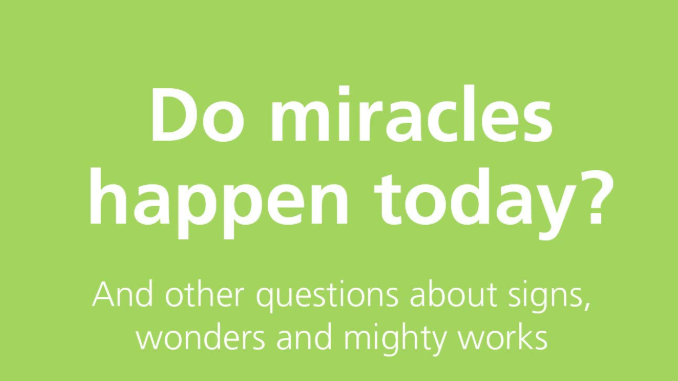
Also by this author: An Ocean of Grace, Life with Jesus: A Discipleship Course for Every Christian, Our Radiant Redeemer: Lent Devotions on the Transfiguration of Jesus
Series: Questions Christians Ask
Published by Good Book Company on March 1, 2020
Genres: Non-Fiction, Theology
Buy on Amazon
Goodreads

Lots of extraordinary stuff happens in the Bible. People walk on water. People touch handkerchiefs and are healed. People disappear into the sky. Did these really happen? What was their purpose? And do miracles happen today?
In this warm and accessible book, Tim Chester looks at the Bible’s view of the existence and purpose of miracles and gives a careful and balanced view on whether healings and other miraculous things happen today.
Such a small book for such a big question. Do Miracles Happen Today? In a palm-sized book of about ninety pages, Tim Chester—pastor of Grace Church in Boroughbridge, UK—provides a brief apologetic for the presence of miracles.
I suppose that’s giving away the book’s final conclusion. Yes, miracles do happen today. In a world that’s virtually committed to a presupposition of antisupernaturialism, that’s a bold statement. Particularly in the UK, belief in the supernatural is lacking at best and even those within Christianity are a bit loathe to profess belief in miracles.
Within this initial question, Chester nests several other questions, which he takes in turn.
Did miracles happen then?
Do miracles happen today?
Why are there fewer miracles today?
What are the greater miracles Jesus promised?
Can I pray for a miracle?
You can see the logical progression. The divide between Christianity and secularists is the existence of miracles. The divide between parts of Christianity—namely, cessationists and continuationists—is whether or not those spiritual gifts have continued or ceased. But even those who believe in the continuation of miracles must admit that there appear to be fewer miracles today than as seen in Scripture.
Chester strikes a balance between believing in miracles and expecting miracles. He recognizes their existence, but doesn’t see them as normative or usual. On the spectrum from miracles don’t exist to believing in healing services, Chester finds himself about in the middle.
Due to the size and nature of the book, the content is basic and foundational. Because of that, there are times when its portrayal of the opposition’s argument is lacking in nuance. Not many would reduce a belief in the absence of miracles to Hume’s tautism where miracles by definition cannot exist (Nature is fact; miracles are against nature; QED, no miracles). Nor would many use the phrase “We cannot let a Divine Foot in the door” as they quote former genetics professor Richard Lewontin. In other words, Do Miracles Happen Today? occasionally self-selects the weakest presentation of the opposition’s argument instead of dealing with better and more recent scholarship.
Chester’s assertion that there are fewer miracles today than in the ancient world is also suspect. I’m not sure I would say so. My friends who minister in areas where the supernatural is taken for granted still experience these types of miracles. The question (as my friend Nik Ripken likes to ask) is whether the greater miracle is God’s supernatural provision of healing or a society in which doctors and healthcare are accessible. This limitation on miracles takes a decidedly Western stance that doesn’t ring true to a majority of the world’s believers across Africa, Asia, and the Middle East.
Do Miracles Happen Today? was intended to start conversations. While I don’t think Chester does so perfectly—and some of this is doctrinal difference and some of this is his space constraints—he does bring up important questions. He does well in shying away from sensationalism and the faux-healers of the Word of Faith and other fringe movements. But overall, I thought the book could have been better argued. It would be an easy book for critics to discount.
